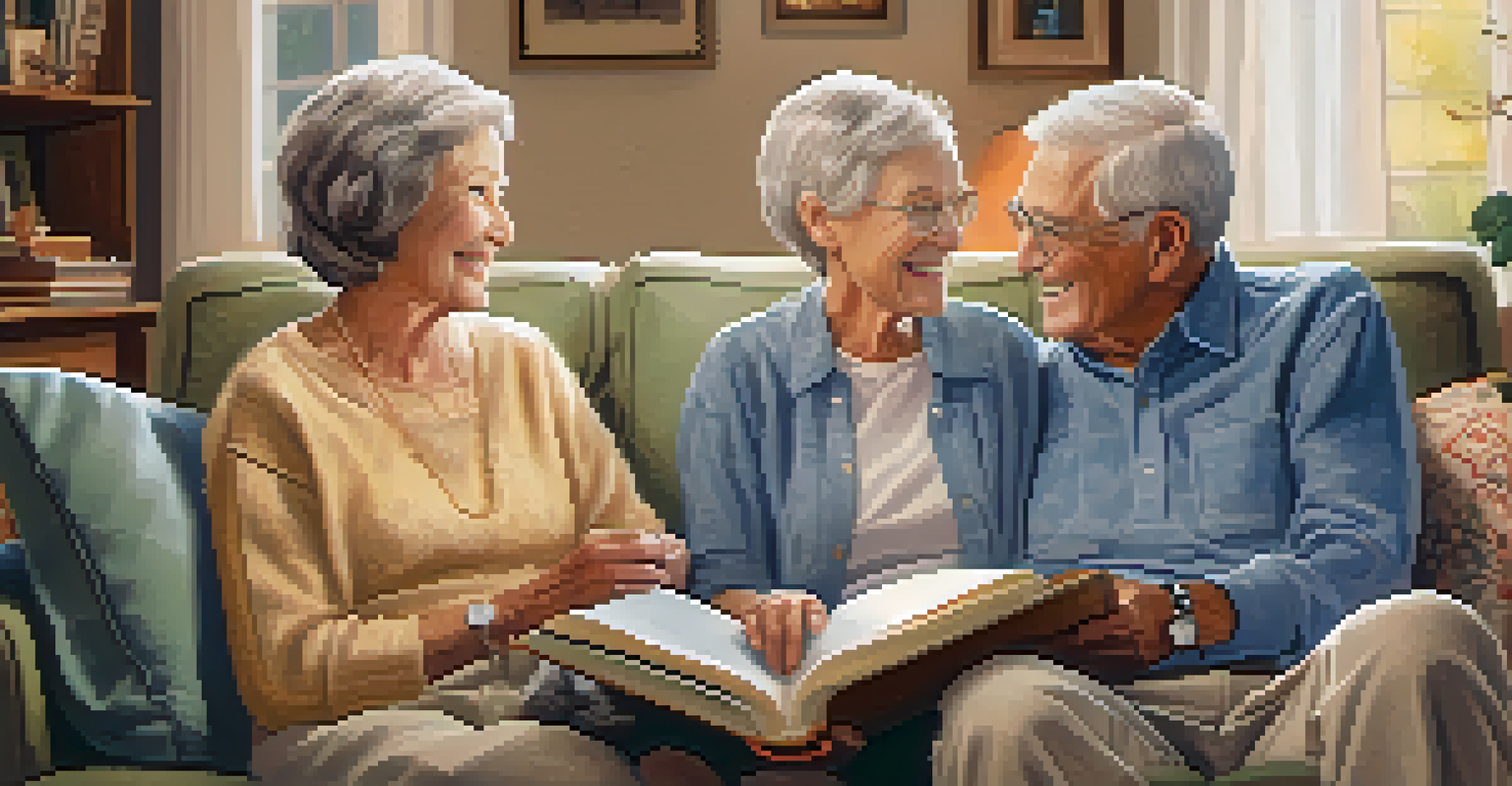Understanding Grief: Coping Strategies for Seniors

What is Grief? Understanding Its Impact on Seniors
Grief is a natural response to loss, and for seniors, it can feel particularly overwhelming. It’s more than just sadness; grief can manifest in various ways, including anxiety, anger, or even physical symptoms like fatigue. Understanding that grief is a personal journey can help seniors navigate this often complex emotional landscape.
Grief is not a sign of weakness, nor a lack of faith. It is the price of love.
For many seniors, loss might come from the death of a loved one, but it can also stem from losing independence, friendships, or even health. Each type of loss can trigger a unique grieving process, reminding us that everyone's experience with grief is different. By recognizing this, seniors can begin to acknowledge their feelings without judgment.
It's important to remember that grief doesn’t follow a set timeline. Some may feel better after a few months, while others might take years to process their emotions. Accepting that there’s no 'right' way to grieve can be liberating, allowing seniors to seek support and healing at their own pace.
Recognizing the Stages of Grief: A Helpful Framework
One helpful way to understand grief is through the stages identified by Elisabeth Kübler-Ross: denial, anger, bargaining, depression, and acceptance. While these stages aren’t linear, they can offer a framework for seniors to recognize their emotions. For instance, a senior might initially deny their loss, which can then shift to feelings of anger as they grapple with the reality of it.

Understanding these stages can help seniors validate their feelings and realize they are not alone in their experience. It’s common to cycle through these stages multiple times, and that’s perfectly normal. By embracing this understanding, seniors can foster patience with themselves as they navigate their grief journey.
Grief is a Personal Journey
Seniors experience grief uniquely, influenced by various types of loss, and it’s important to acknowledge their feelings without judgment.
It’s also worth noting that some seniors may not experience all these stages. Each person's grief is unique, shaped by their experiences and relationships. Being aware of this individuality can enhance compassion for oneself and others who are grieving.
The Importance of Social Support in Coping with Grief
Social support is crucial for seniors dealing with grief. Connecting with friends, family, or community groups can provide a sense of belonging and understanding during tough times. Whether through a phone call or a support group, reaching out can help reduce feelings of isolation that often accompany grief.
To weep is to make less the depth of grief.
Sharing stories about the person or thing lost can be incredibly healing. It allows seniors to celebrate memories while also processing their feelings. Engaging with others who have experienced similar losses can foster a sense of camaraderie that helps alleviate the burden of grief.
For seniors who may feel shy or hesitant to seek support, starting small can make a difference. Even joining an online community or attending a local support group can offer a gentle introduction to sharing and healing. Social connections can be a lifeline, reminding seniors they are not alone in their struggles.
Healthy Ways for Seniors to Express Their Grief
Finding healthy outlets for grief is crucial for seniors to manage their emotions. This might include journaling, painting, or engaging in other creative activities that provide a voice to their feelings. Expressing grief through art or writing can be a cathartic experience, allowing for reflection and release.
Physical activity can also be an excellent way to cope with grief. Simple activities like walking, gardening, or even gentle yoga can help reduce stress and improve mood. Movement encourages the release of endorphins, which can counteract feelings of sadness and anxiety.
Social Support Eases Grief
Connecting with friends, family, or support groups can significantly reduce feelings of isolation and help seniors cope with their grief.
Additionally, incorporating mindfulness practices such as meditation or deep breathing can provide emotional relief. These practices encourage seniors to stay present and acknowledge their feelings without judgment, fostering a healthier relationship with their grief.
Understanding the Role of Rituals in Grief
Rituals can play a significant role in helping seniors cope with grief. Whether it’s attending a memorial service or lighting a candle in remembrance, these activities provide a structured way to honor a loved one. Engaging in rituals can help seniors feel a connection to the person they lost, making the grieving process feel more tangible.
Creating personal rituals can also be a meaningful way to cope. This could involve visiting a favorite place of the deceased, cooking their favorite meal, or simply sharing stories with family. These acts can serve as a reminder of the love shared and can help keep the memory alive.
Furthermore, rituals can provide a sense of closure and facilitate healing. They allow seniors to express their grief publicly or privately, depending on their comfort level. Embracing these practices can be an essential part of the grieving journey.
Seeking Professional Help: When to Consider Therapy
While support from friends and family is invaluable, some seniors may benefit from professional help in managing their grief. Therapists or counselors trained in grief can offer insights and coping strategies tailored to individual needs. Recognizing when it’s time to seek professional help is a crucial step in the healing process.
Signs that professional support may be needed include prolonged feelings of deep sadness, an inability to cope with daily life, or feelings of hopelessness. If grief becomes overwhelming or leads to depression, reaching out to a mental health professional can be a vital step towards recovery.
Healthy Outlets for Grief
Engaging in creative activities, physical movement, and mindfulness practices can provide seniors with effective ways to express and manage their grief.
Therapy can provide a safe space for seniors to process their emotions and develop healthy coping mechanisms. It’s never too late to seek help, and doing so can empower seniors to move forward in their grieving journey.
Finding Hope and Moving Forward After Loss
Although grief can feel all-consuming, finding hope after loss is possible. It’s essential for seniors to remember that healing doesn’t mean forgetting; it means cherishing memories while allowing joy to return to life. Gradually engaging in activities that bring happiness can help rekindle a sense of purpose.
Creating new traditions or finding new hobbies can be a beautiful way to honor the memory of a loved one while also embracing life. Whether it’s volunteering, taking a class, or simply spending time in nature, these activities can provide a meaningful outlet for grief and transformation.

Ultimately, moving forward doesn’t mean leaving the past behind. Seniors can carry their memories with them as they navigate life’s new chapters. With time, patience, and the right support, finding hope and joy after loss is not just a possibility; it can be a profound reality.